News feed
The New Management of BME Has Started Its Work
2024. 07. 04.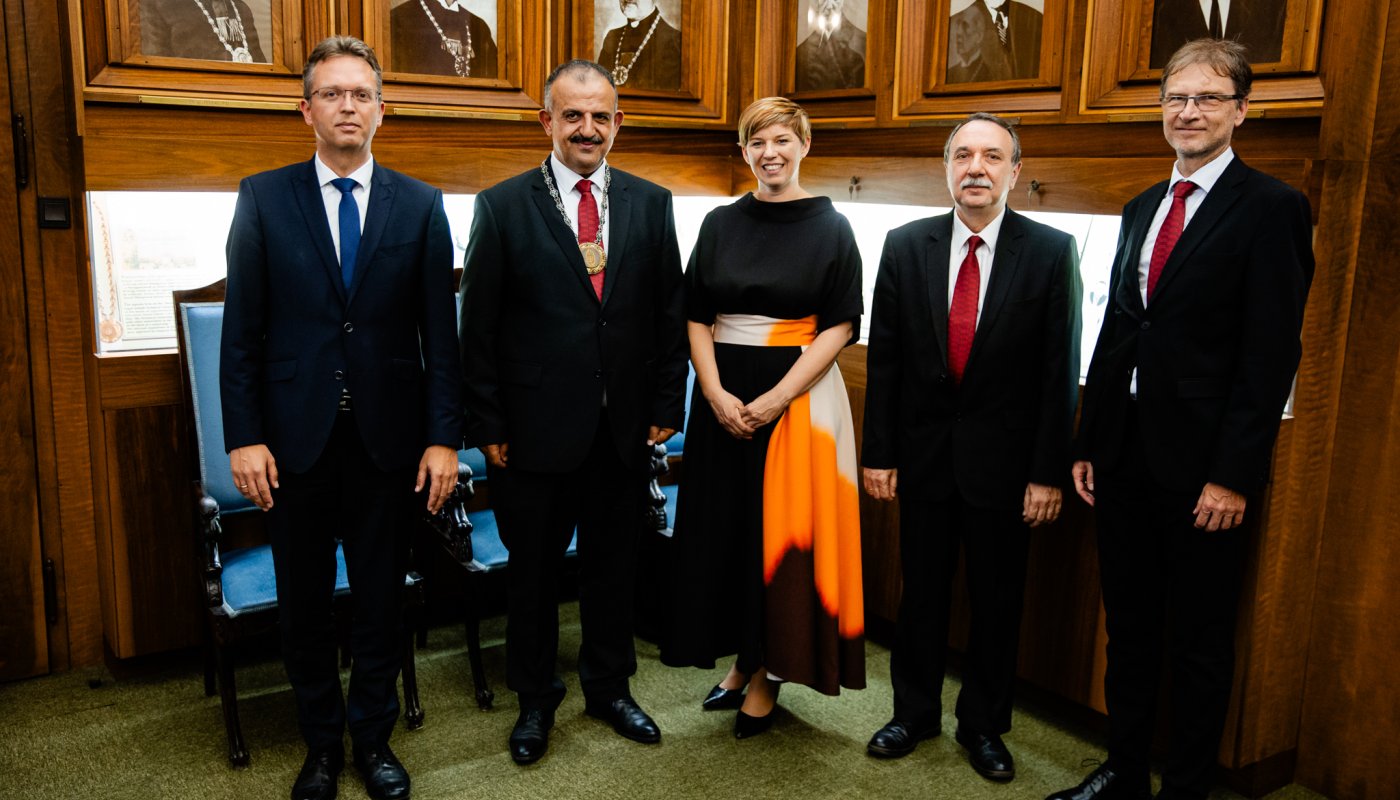
Hassan Charaf has taken over the rector’s chain and introduced the university's new vice-rectors.
Tamás Sulyok, President of the Republic, appointed Hassan Charaf, university professor and former dean of BME’s Faculty of Electrical Engineering and Informatics, as the rector of the Budapest University of Technology and Economics (BME), effective 1 July. Hassan Charaf’s term as rector commenced on 1 July 2024 and will run for five years. The decision of the President of the Republic regarding the rector’s appointment was published in the Hungarian Official Gazette on 28 June.
Hassan Charaf received the rector’s chain from the University’s outgoing rector Tibor Czigány during an event held in the Rector’s Chamber at BME on the afternoon of 1 July.
Members of the University’s Senate were invited to the event, which was also attended by Balázs Hankó, Minister of Culture and Innovation, and Veronika Varga-Bajusz, State Secretary for Higher Education, Vocational and Adult Education and Youth Affairs.
Hassan Charaf is an engineer and an economist, as well as a doctor of the Hungarian Academy of Sciences. Born in Lebanon, he studied at the Department of Automation and Applied Informatics at the Faculty of Electrical Engineering and Informatics of BME. He joined the staff of the department in 1996, became Head of the Department in 2016 and later Dean of the Faculty in 2019. Since 1992, his scientific, research and teaching activities have been related to software development, and between 2004 and 2015 he worked as the Development director of the BME Mobile Innovation Centre. |
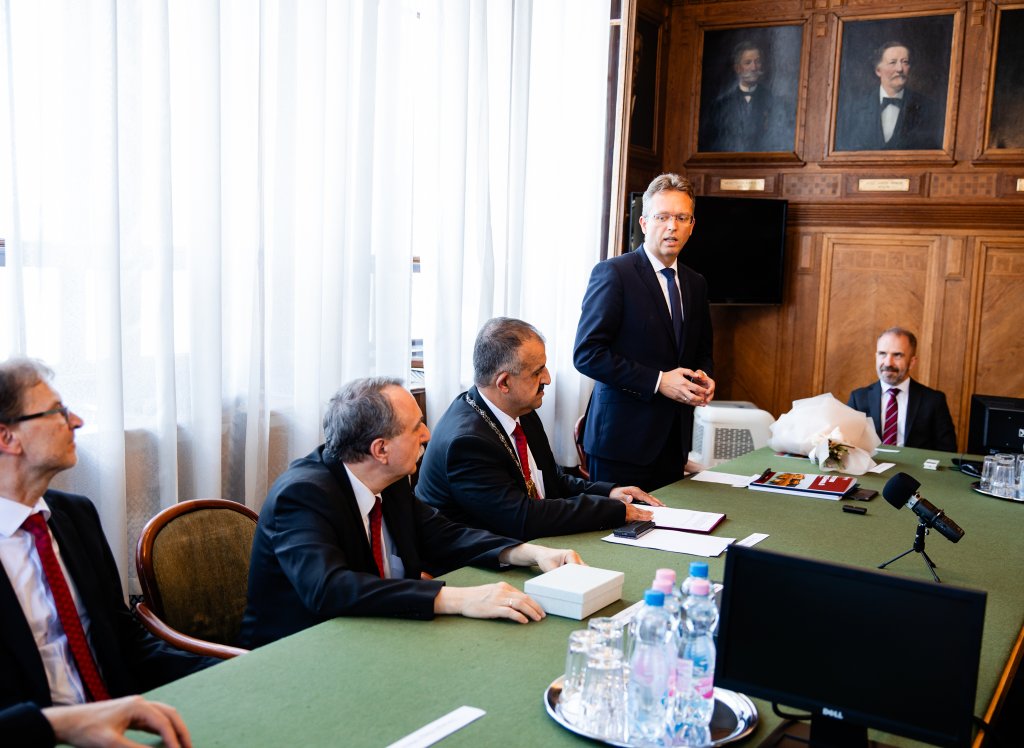
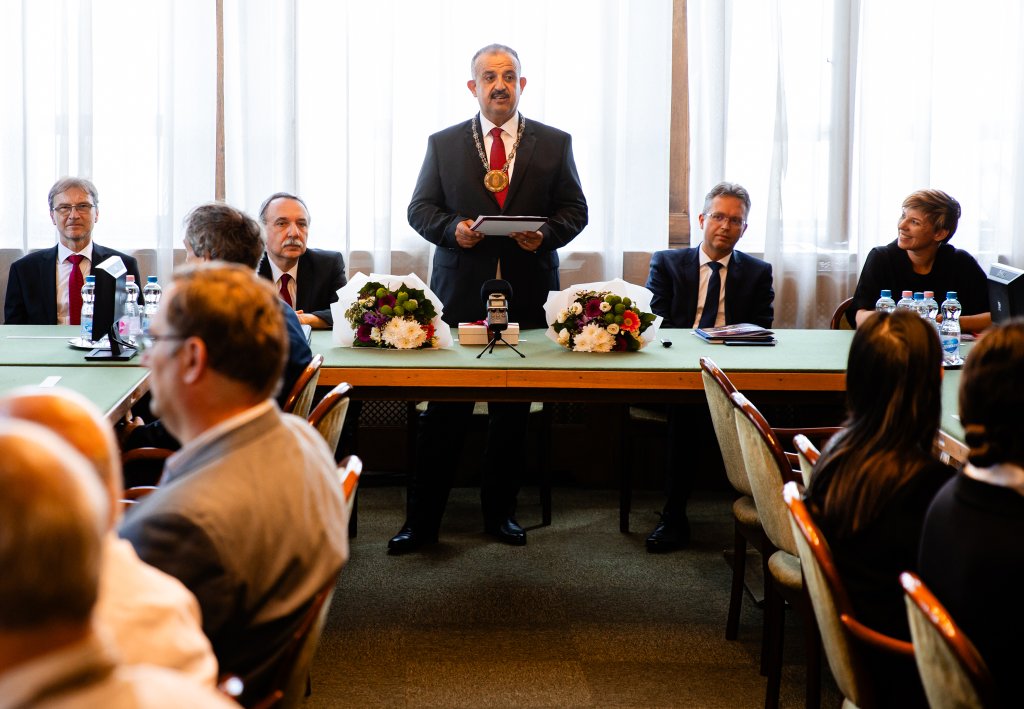
In his address, Tibor Czigány highlighted the significance of the rector’s chain: “This symbol represents the elected rector’s mandate to govern the university.” Tibor Czigány quoted former rector Gyula Wälder, who handed over the rector’s chain to his successor, Ágoston Zimmermann, on 8 October 1939, saying: “This chain is a symbol of power and the rights and responsibilities that come with that power. It reminds us to represent the organisational and intellectual unity of the university outwardly and ensure the spiritual harmony and operational coherence of the various faculties inwardly. This chain is a reminder of the traditional spirit of the University.”
Hassan Charaf thanked Tibor Czigány for his service to the university over the past three years, highlighting that “he had to manage unprecedented situations”.
In his speech, he expressed his gratitude and noted the significance of the fact that “Minister Balázs Hankó and State Secretary Veronika Varga-Bajusz’s first official visit was to BME”,
adding that “For us, this means that the operator and the head of the sector both understand that BME, one of Hungary’s finest institutions of higher education, is of public interest as a cornerstone of the country’s economic development and competitiveness, and an internationally embedded hub providing a continuous supply of qualified professionals.”
The rector’s chain is also a symbol of the University’s autonomy, which, according to Hassan Charaf, means independence: “The independence of BME is not just a slogan: it is the key to success. Autonomy means we hold our fate in our hands, shaping it continuously through dialogue with our operator, our closer and wider environment, and the national and international networks represented by our former and current students, employers of our graduates, and scientific and professional organisations.”
At the end of his speech, Hassan Charaf presented Tibor Czigány with a gift, thanking the former rector “for his life intertwined with the University of Technology.” He added that the symbolic gift was an old university seal from 1882, used by his predecessors to authenticate diplomas.
Balázs Hankó also thanked Tibor Czigány for his work and congratulated the new rector: “I wish Professor Hassan Charaf much success as he takes on the trust to lead, develop, and adapt one of Hungary’s most prestigious universities to the challenges of our times for the next five years. I believe one of the most important tasks for university professionals today is to provide high-quality, modern, and competitive knowledge to their students. This, I am convinced, is our common goal, ultimately serving the prosperity and advancement of Hungary and the Hungarian nation.”
Hassan Charaf also introduced the new rectoral management team, consisting of four vice-rectors who have been successful faculty members and leaders at BME for many years: Péter Bihari as Vice-Rector for Education, János Levendovszky for Research and Innovation, András Nemeslaki for International Relations, and Gergely Zaránd for Scientific Affairs.
Péter Bihari graduated as a mechanical engineer from BME in 1995 and earned his PhD in 2007. He worked for several years as the head of the Department of Energy Engineering of the Faculty of Mechanical Engineering (GPK), and from 2012 he also served as the Vice-Rector for Education of GPK. Since 2019, he has been the university’s Director for Education, and he has held the position of Vice-Rector since 2021.
János Levendovszky is a university professor of the Department of Networked Systems and Services at the Faculty of Electrical Engineering and Informatics of BME. He has spent several terms as a visiting professor and researcher at various universities abroad, including in Belgium, the United Kingdom, Lithuania, the United States, Japan, and South Korea. Since 2009, he has led the Doctoral School of Informatics of BME. He was the Vice-Dean for Scientific and International Relations at the Faculty of Electrical Engineering and Informatics for several years and served as Vice-Rector for Science and Innovation in the previous two rectoral cycles.
András Nemeslaki is a university professor and the head of the Department of Management and Business Economics of the Faculty of Economic and Social Sciences of BME. His fields of expertise include information management, digital transformation of enterprises, and the promotion of corporate innovation. He leads the cooperation programme between BME and the Hungarian National Bank (MNB). Previously, he was a faculty member at the CEU Business School, International Vice-Dean of the Faculty of Economics at the Corvinus University of Budapest, Vice-Rector for Scientific and International Affairs at the National University of Public Service, and president of the Tempus Public Foundation responsible for higher education mobility projects.
Gergely Zaránd is a theoretical physicist, university professor, and a full member of the Hungarian Academy of Sciences. Since 2015, he has been the director of the BME Institute of Physics. He studied at ELTE and the École Polytechnique in Paris, obtaining his Master’s degree from ELTE in 1992, and his doctorate from BME three years later. He worked as a postdoctoral researcher at Harvard University and the Argonne National Laboratory, and later as a visiting professor at the Karlsruhe Institut für Technologie and the Freie Universität Berlin. At the Faculty of Natural Sciences at BME, he is the head of research of the Quantum Information National Laboratory. In 2011, he was the first to establish a Momentum research group at BME in order to study miniature circuits highly relevant for the development of microelectronics.
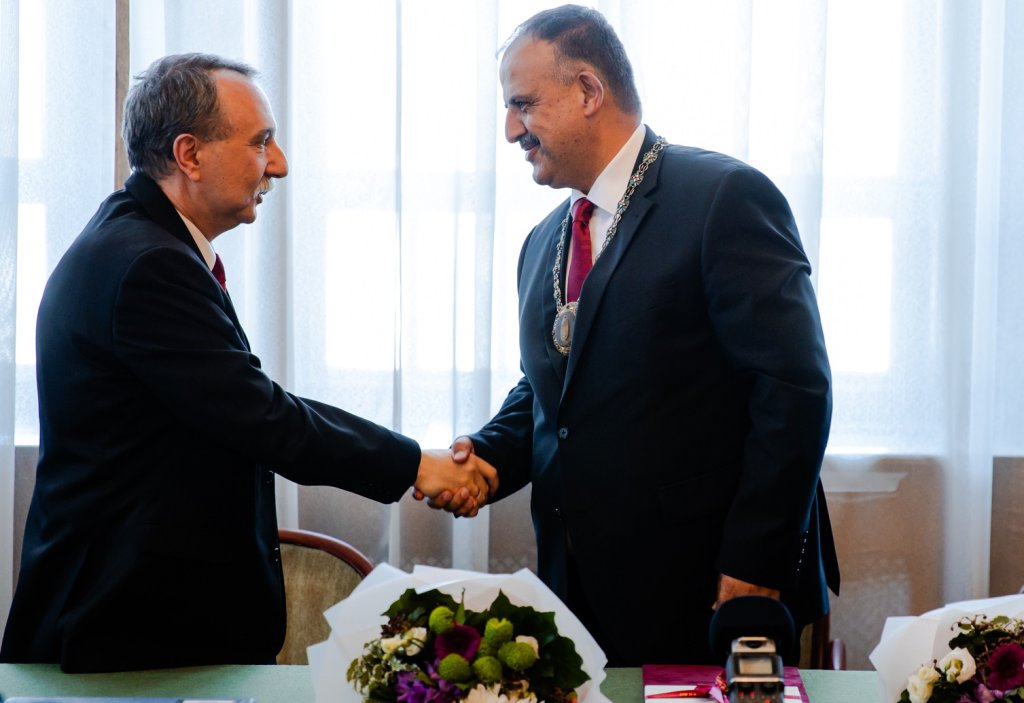
The Senate of BME, consisting of 28 members, listened to the rectoral candidates’ programme presentations on 10 June 2024. The presentations had been presented to the University community in several forums over the preceding month. The Senate then voted by secret ballot, with Hassan Charaf receiving more than two-thirds of the votes. The other candidate was Rita Kiss, academic, university professor, and head of the Department of Mechatronics, Optics and Mechanical Engineering Informatics of the BME Faculty of Mechanical Engineering. Tibor Czigány did not seek re-election at the end of his three-year term. He summarised the achievements of the leadership team working in the 2021-2024 rectoral cycle in a rectoral report. |
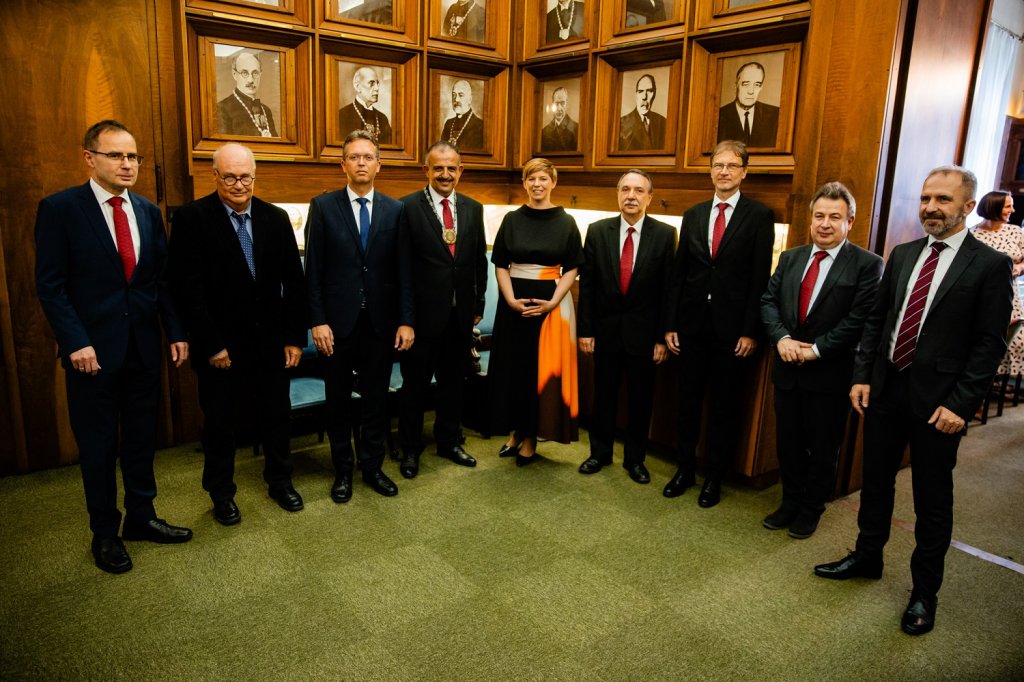
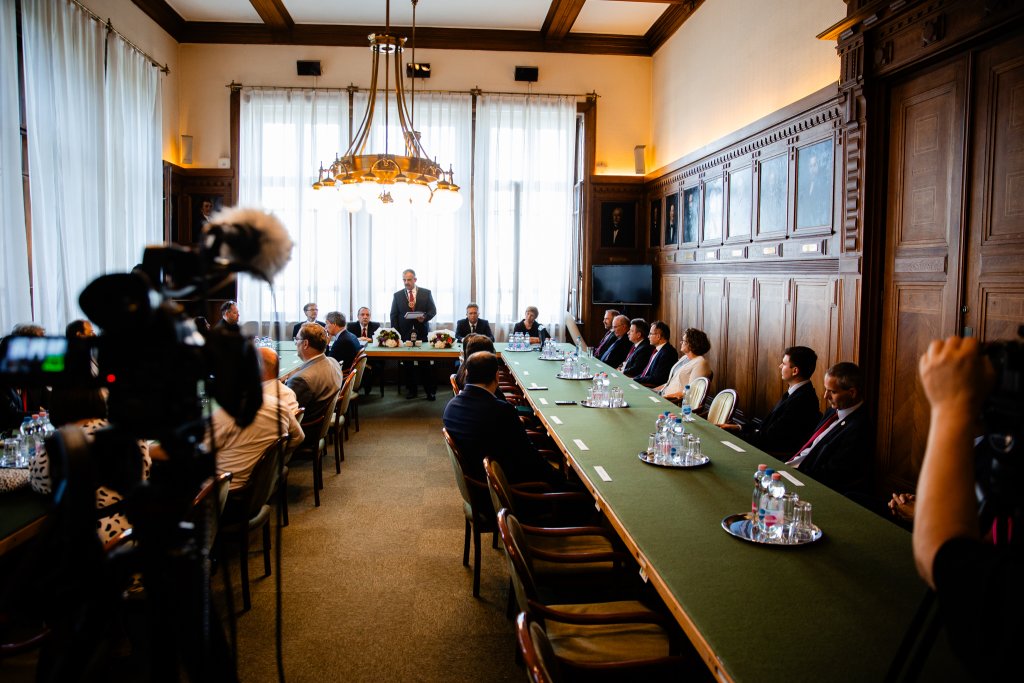
Rector's Office Department of Communications
